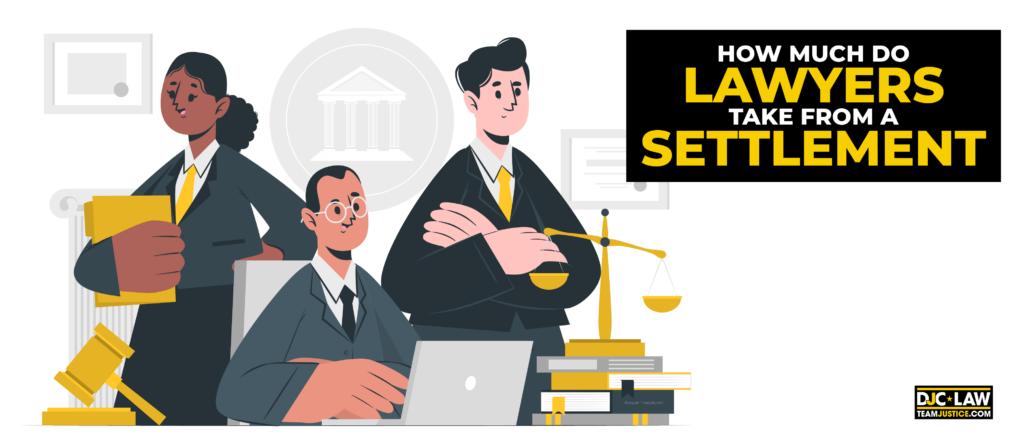
Lawyers always receive a fee for their services, but how much do lawyers usually take from a settlement? Your lawyer’s fee depends entirely on the value of your settlement because their payment is defined in percentage terms.
According to On the Map Marketing, 39.5 million personal injury cases require medical treatment every year, meaning your claim could be worth thousands. Since you don’t pay upfront for legal representation in a personal injury case, your lawyer’s costs come from your settlement.
In this guide, we discuss what your lawyer costs, how much you could be left with, and the factors impacting your settlement.
Key Takeaways
- The standard amount a lawyer receives from a personal injury settlement is 33% or a third of the settlement.
- Average personal injury settlements are on the rise. According to Consumer Shield, the overall average settlement for personal injury is $113,391.
- How much a lawyer’s contingency fee is depends on the complexity of the case, the expected payout, and the lawyer’s reputation and experience.
- The average recovery for people not hiring a lawyer is a mere $17,600, whereas with a lawyer, it could be up to four times as much.
- Additional costs and expenses, such as investigation and court filings, are charged separately and may have to be paid whether you win or lose your case.
- Hiring a lawyer is a proven way of increasing the size of your settlement many times over because of their knowledge and professional experience.
What Percentage Does a Lawyer Get in a Settlement Case?
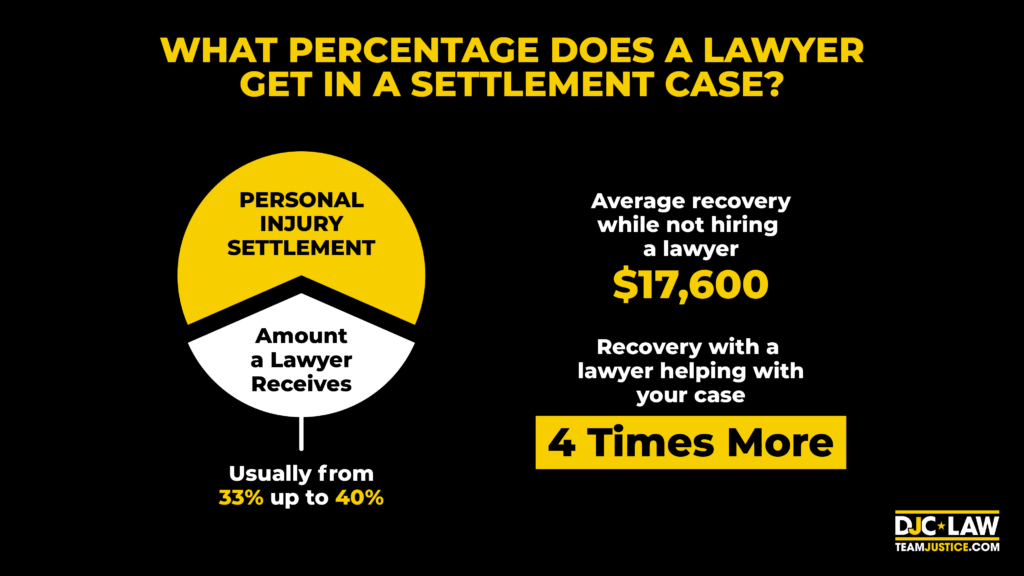
The standard amount a lawyer receives from a personal injury settlement is 33% or a third of the settlement. Some lawyers may charge up to 40% to represent you.
High fees are among the leading reasons why you might be hesitant to hire a lawyer. However, LegalJobs.io found that the average recovery for people not hiring a lawyer is a mere $17,600, whereas with a lawyer, it could be up to four times as much.
In other words, although the percentage a lawyer takes might be high, it’s actually a false economy not to hire a lawyer in favor of dealing with your own case.
How Much Compensation Should You Expect?
Average personal injury settlements are on the rise. According to Consumer Shield, the overall average settlement is $113,391. However, the value of your settlement depends on the severity of your injuries, negligence, and how good your lawyer is.
The problem with the above figure is it combines every type of personal injury case so that the figure can be artificially inflated by a few high-value cases. If we look at a Forbes report that examined cases up to 2005, the median award was just $31,000.
The best way to determine how much you could be entitled to is to talk to your lawyer. Your personal injury attorney can’t tell you exactly what you’ll get, but they can use their experience to give you a rough estimate. Remember, The Law Dictionary finds that 95% of civil cases reach settlements, so your chances of getting something are pretty high.
What is a Contingency Fee?
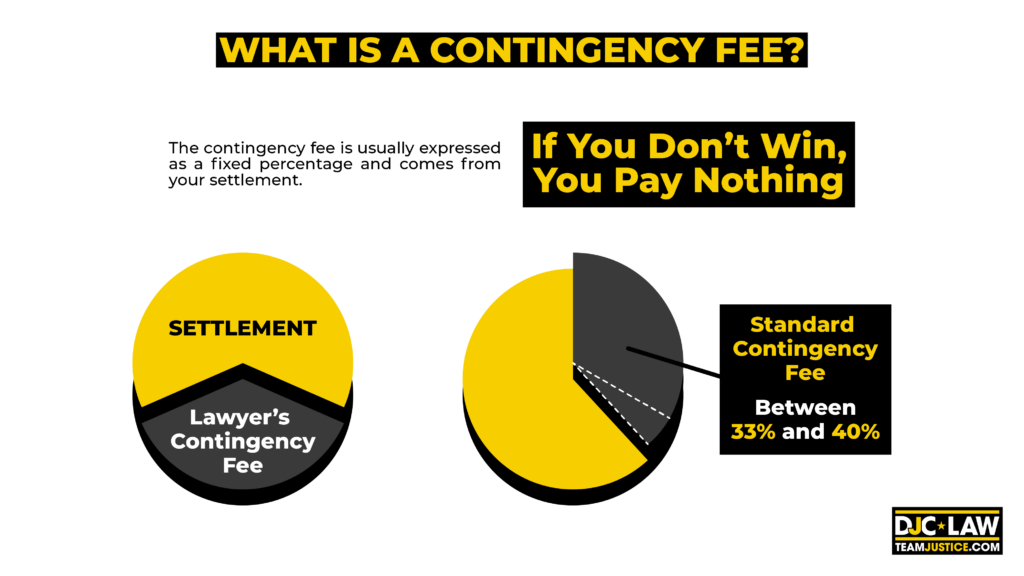
Most personal injury lawyers use a contingency fee to get paid. In other words, they only get paid if they win, which is why you hear the “no win, no fee” slogan. The contingency fee is usually expressed as a fixed percentage and comes from your settlement. If you don’t win, you pay nothing.
Every lawyer sets their own fee, which you’ll see expressed in the written contingency fee agreement you sign. When you agree on a settlement, your lawyer’s contingency fee is deducted from the settlement before you get paid.
According to AllLaw, standard contingency fees are between 33% and 40%. Note that due to the risk of not getting paid or the risk of a settlement not being large enough, lawyers may refuse to take on a case if they don’t believe it’s worth their time.
What are the Factors that May Affect Your Attorney Fees?
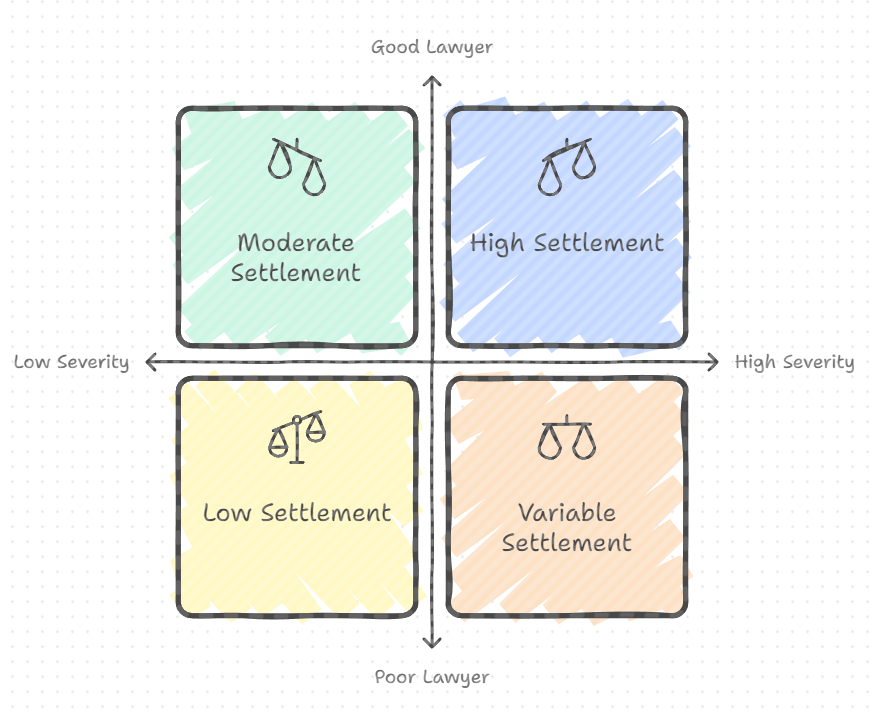
Lawyers may alter their fees depending on the case. Factors like the complexity of the case, the expected payout, and the lawyer’s reputation all play into how much an attorney may charge to fight your personal injury settlement.
Here’s a rundown of these factors in detail:
Complexity – Complex cases mean your lawyer will spend more time on it. The extra work is accounted for by charging a higher contingency fee.
Expected Payout – Your lawyer may actually charge a lower contingency fee if they believe that they’re looking at a huge settlement. This ensures they’re still well compensated, but their client is financially taken care of.
Reputation – Highly respected lawyers know they can charge more because of their expertise and track record of success. That’s why a high-powered New York law firm working solely with celebrity clients might charge more than a small-town lawyer with just a few years of experience.
However, most personal injury lawyer fees are in a similar ballpark. That’s why you shouldn’t prioritize fees and instead concentrate on the quality and service of the law firm you choose to represent you.
What Types of Cases Do Personal Injury Attorneys Handle?
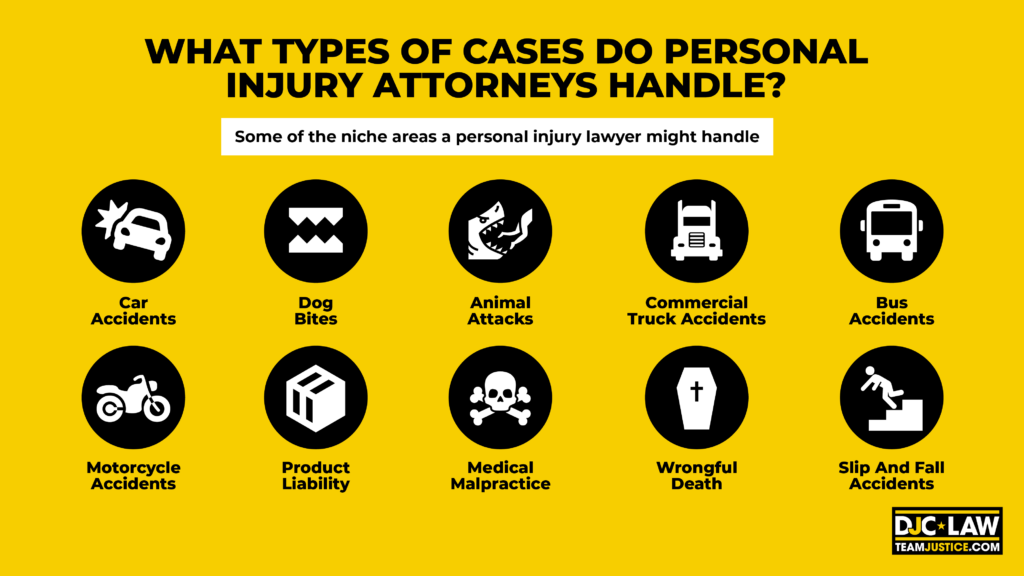
Cornell University defines personal injuries as all types of injuries impacting the body, emotions, and reputation. Personal injury is a vast area of law encompassing everything from slip and fall to auto accidents.
Let’s run down some of the niche areas a San Antonio personal injury lawyer might handle:
Car accidents
Dog bites
Animal attacks
Commercial truck accidents
Bus accidents
Motorcycle accidents
Product liability
Medical malpractice
Wrongful death
Slip and fall accidents
Note that some personal injury law firms focus exclusively on certain types of cases. For example, an attorney might concentrate exclusively on car accidents, whereas another may specialize in medical malpractice claims.
What Do Attorney Fees Cover?
Attorney fees cover the work your lawyer puts into building your case and fighting it. These costs include the legwork of building a case, gathering evidence, and filing your case in court. Additional costs and expenses may be added to their bill separately or may be covered as part of the contingency fee.
Examples of other costs that attorney fees cover include:
Costs of obtaining official records and reports
Hiring expert witnesses
Postage fees
Transcription costs
Court filing fees
These are often unavoidable costs you’d have to pay if you were fighting your own case anyway. Expenses like these are simple reimbursements that come out of your final settlement. Of course, if you don’t win your case, these costs may be absorbed by the lawyer and written off as losses, whereas others may still bill you for them.
Who Covers My Medical Bills?
Plaintiffs often require immediate medical treatment after an accident. Consult your health insurer to deal with your medical needs. Since it can take months to receive a settlement, you’ll be expected to handle your own medical bills in the meantime.
Firstly, “What if my medical bills are more than my settlement?” Most claimants use their own health insurance company in the meantime. Others who don’t have insurance may pay out of pocket in anticipation of getting reimbursed when their settlement comes through.
Certain medical providers may even bill you but suspend any payments and interest in anticipation of a successful settlement. Your lawyer can provide you with options and negotiate in your name if you’re struggling to cover your medical bills.
Due to the high cost of medical care, some insurers and defendants rely on delay tactics in anticipation of the plaintiff giving up under the financial strain and accepting a lower settlement than they’re entitled to.
What Don’t Attorney Fees Cover?
Attorney fees don’t cover everything. Often, an attorney will separate case-related expenses from their contingency fee. The costs of investigations, hiring expert witnesses, and obtaining official reports are usually itemized separately from the contingency fee.
Assuming you’re working with a lawyer on a contingency fee basis, you won’t pay anything if you lose your case. On the other hand, you may still have to pay the legal fees related to the case, such as court fees or the cost of obtaining medical records.
Ensure you read through your agreement carefully to understand what you’re liable for if you win or lose and what the contingency fee covers/doesn’t cover.
What’s the Most Personal Injury Lawyers Can Take from a Settlement?
Fee percentages are defined by a patchwork of federal and state laws, meaning attorneys are limited in what they can take from a settlement. Likewise, the competitive legal market also impacts standard fee percentages, which is why the general rule of thumb is lawyers will take a third of any settlement.
It’s also vital to mention the sliding scale attorneys use. For example, the New York City Bar Association states that while the usual percentage is 33%, attorneys are entitled to use a sliding scale, such as charging 50% of the first $10,000 recovered.
Over in Florida, attorneys are more limited in what they can charge. The Florida Bar outlines that the state constitution entitled clients to a minimum of 70% of the first $250,000 from any settlement.
In other words, take the time to examine what the rules are in your area for more information on the maximum your lawyer can charge.
How Do Lawyers Negotiate Settlements?
Lawyers negotiate settlements by accounting for economic and non-economic damages and then building an argument using firm evidence. They’ll use communication, psychological insights, and legal knowledge to get the maximum award possible.
Like most negotiations, lawyers will make a higher initial demand so that it can be negotiated down appropriately. It’s in nobody’s interest to go through an expensive court trial process, which is why so few cases actually go to court.
Some of the damages your lawyer might attempt to claim compensation for include:
Medical costs
Loss of wages
Lost earnings potential
Pain and suffering
Property damage
Loss of quality of life
Loss of companionship
Lawyers are there to explore every avenue when winning your settlement, which is why they’re essential to have on your side. Despite this, the National Institutes of Health reported that only 72.2% of personal injury claimants sought legal advice.
Are There Any Additional Fees and Expenses in Settlement Cases?
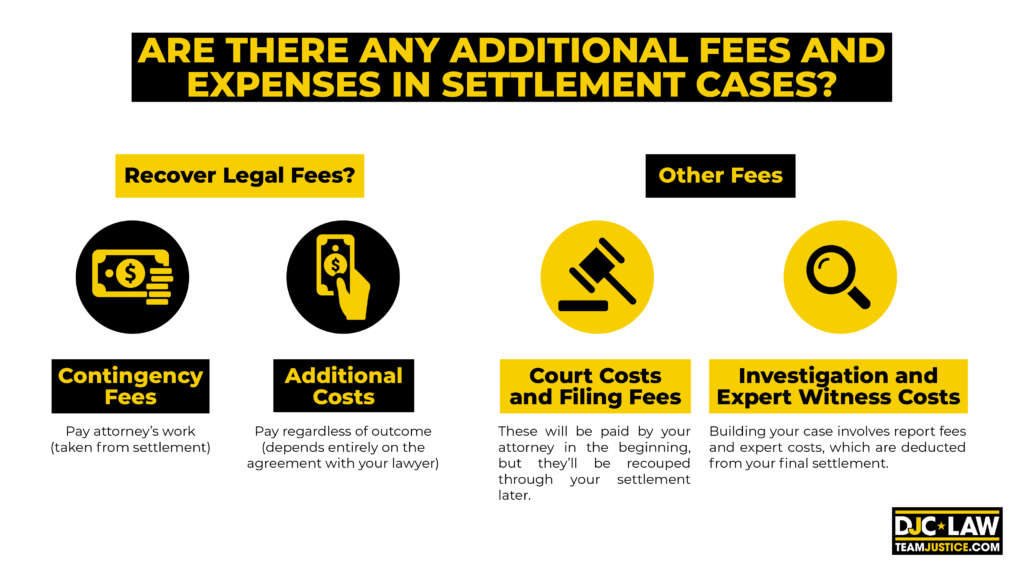
Contingency fees represent the work of your attorney, but any extra costs a lawyer has to incur will be separated into another category. The costs of filing your case, other court costs, expert witness costs, and general costs of investigation must be paid out of your settlement.
Additional fees and expenses in your settlement case may have to be paid regardless of whether you win or lose – this depends entirely on the agreement you’ve got with your lawyer.
Can you recover your legal fees from the other party as part of a successful personal injury case? You can, but it isn’t common in personal injury lawsuits. Examine the specifics of your claim and any state laws to find out if you’re eligible to reclaim these costs.
Court Costs and Filing Fees
It costs money to file a case in the first place. Additionally, if you’re one of the minority of cases that go to a court trial, this will incur extra costs. These will be paid by your attorney in the beginning, but they’ll be recouped through your settlement later.
Investigation and Expert Witness Costs
Building your case means ordering copies of official reports, with most states charging a fee for everything from official police car accident reports to medical reports. These types of documents form the foundations of your case, so your attorney will have to pay the fees to access these documents.
Again, if your case goes to trial, this is where these costs can balloon. You may be required to hire expert witnesses, such as accident reconstruction experts, to strengthen your case. All of these professionals have to be paid, which will come out of your final settlement.
What is the Usual Result of a Settlement?
Agreeing to a settlement means signing a settlement agreement that ends a dispute and voluntarily dismisses any current or pending litigation. You’ll receive an agreed-upon financial sum after signing your settlement agreement. Most parties keep settlement agreements private.
The result of a settlement means your attorney will deduct their contingency fee and any related costs. Once everyone has been paid out of the settlement, you’ll receive whatever is left. How quickly you’re paid depends on where you are, but it could be as little as five working days or as long as 28 working days.
What would be considered a good result from your settlement? A good settlement means getting as close to the estimated judgment value as possible. Ask your lawyer what they would consider an ideal settlement amount because only they have the expertise to tell the difference between a good and a bad settlement.
How Long Can a Lawyer Hold a Settlement Check?
Your lawyer is required to provide you with your settlement check in a “reasonable time.” This usually means 30-45 days after you sign the settlement agreement, but most personal injury attorneys try to be quicker.
Once the other party has written a settlement check, it’ll be sent to your lawyer. Your attorney will then cash it into an escrow account and deduct their fees. Whatever is left over will be sent to you, thus emptying the escrow account.
Note that some special circumstances could delay your settlement check further. For example, some settlements may require court approval, which will delay your settlement. One scenario is that you were under 18 when you experienced an accident, and so couldn’t pursue your claim on your own. The court has to approve your settlement if it was arranged by a parent or guardian.
Is it Worth Hiring a Personal Injury Lawyer?
Hiring a personal injury lawyer always makes sense because they have a robust track record of higher personal injury settlements, do all the legwork for you, and provide you peace of mind because they handle everything on your behalf.
Here are the main benefits of hiring a personal injury lawyer to handle your case:
Experience in handling claims similar to yours.
They know the intricacies of the legal process.
Lawyers know the underhand tactics insurers might employ to reduce your settlement.
They have the tools needed to investigate your claim thoroughly.
Attorneys will walk you through the stressful and complicated process of attending court.
Maximum compensation guaranteed.
They have your best interests at heart because if they don’t win, they don’t get paid.
Breathing space to recover from your injuries and put your life back together.
Lawyers don’t just make your life easier. They’re an investment that pays. According to Nolo, the average personal injury settlement gained by a lawyer is three to four times higher than settlements won by people who file and fight their own cases.
Personal Injury Settlement FAQs
What is a Good Settlement Figure?
A good settlement figure is one that comes as close to the anticipated court judgment value as possible. How much a good settlement is in dollar terms depends entirely on the type of case and the severity of your injury.
Lawyers use previous cases and their own experiences to determine how much you could be entitled to and what a reasonable figure could be.
Do I Have a Personal Injury Case?
Your lawyer will determine whether you have a case by examining your losses and who was at fault. Generally, you have a case if you suffered economic or non-economic losses through the actions or inactions of another party.
Most law firms offer free consultations, where an attorney will go through the ins and outs of your case and provide an honest assessment of whether it’s worth taking legal action.
How Long Do I Have to File a Personal Injury Claim?
Every state has its own statute of limitations, but the average amount of time you have to file your case is two to four years after your accident. We recommend filing your case as soon as possible to ensure you build your case while the memories and evidence are fresh.
Note that medical malpractice cases have distinct statutes of limitations. Instead of a standard statute of limitations, the clock begins running from when you discovered or should have discovered the injury rather than from the day you received medical care.



